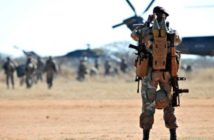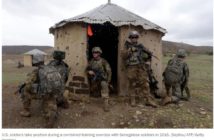Eurasia Review
On April 5, the influential Mali tribal chief Intalla Ag Attaher returned to his homeland after two months in a hospital in Morocco. Back home he called for a decisive resolution to the deeply-divided west African nation’s fragile peace process.
Intalla Ag Attaher’s tribes of the northern Ifoghas mountains have partnerned with the National Movement for the Liberation of Azawad (MNLA), an armed collective of ethnic Tuaregs which rose up against the state in 2012. The patriarch made a decisive call for all factions in Mali to make a lasting and just peace to concentrate on deploying efforts for the development of Mali.
AFP reported that the influential tribal chief was greeted on his return to Kidal by hundreds of cheering wellwishers, Attaher appeared in “much better shape”, according to witnesses, than when he had left for Rabat in February, on the invitation of the King of Morocco, Mohammed VI. “Yes, after his triumphant return… Intalla Ag Attaher appealed for peace in northern Mali, in southern Mali, across Mali,” said Mamoud Diakite, an official in the governor’s office.
Diakite said the tribal chief urged the Moroccan king to “continue its efforts to restore peace in northern Mali”. Mohammed VI visited Mali in February to support its peace process. The visit took place with preliminary meetings under way in Bamako ahead of peace negotiations between the government and armed insurgents in the north, including the MNLA.
In January 2014, King Mohammed VI received at the Royal Palace in Marrakech, Bilal AG Cherif, Secretary General of the National Movement for the Liberation of Azawad (MNLA),. During this meeting, the Monarch reiterated the constant concern of the Kingdom of Morocco to preserve the territorial integrity and stability of the Republic of Mali, as well as the need to contribute to a solution and a compromise that would help fight the fundamentalist and terrorist organizations that threaten the Maghreb countries and the Sahel, and promote the development and dignity of the people of Mali, the same source added.
For his part, Bilal AG Cherif gave an overview on the latest developments of the situation in northern Mali, and expressed his gratitude to His Majesty the King for his commitment to the fight violence, extremism and terrorism that are threatening the Sahel and Sahara. The National Movement for the Liberation of Azawad was known as a secular separatist Tuareg rebel group that was fighting for an independent state in northern Mali called Azawad. MNLA wanted this state for all the peoples of northern Mali (Tuaregs, Songhai, Arabs, and Fulani the main ethnic groups). The group which once controlled the cities of Gao and Kidal has largely melted back into the population and joined the french military troops to chase terrorist groups in the region.
The MNLA spearheaded the rebellion against the Malian government before it was expelled from the biggest cities in Azawad by al-Qaeda and its allies, including Ansar al-Din and the Movement for Tawhid and Jihad in West Africa (MUJAO). It is important to remember the genesis of this crisis was an action by the MNLA to take over northern Mali.
The aspirations of the MNLA were deep-rooted going back to the first Tuareg rebellion in 1963. Their demands have now completely changed and a new political vision now prevails within the ranks and the leadership of this movement. MNLA is a movement that has abandoned the claim of independence a few months after the outbreak of the crisis in Mali. It has become part of a process of dialogue and peace in Mali. The movement has abandoned completely the armed struggle and currently is voicing a powerful campaign for a united and indivisible Mali and is calling for consideration of the uniqueness of the people of northern Mali. It was the only movement to have fought terrorist groups in northern Mali at the beginning of the crisis in 2012. MNLA was the prior target of Mokhtar Belmokhtar also known as Khaled Abou El Abbas or Laaouar, an Algerian an terrorist, leader of the group Al-Murabitoun, former military commander of Al Qaeda in the Maghreb and kidnapper, smuggler and weapons dealer. The leader of MNLA Bilal Ag Cherif was seriously injured in Gao in June 2012.
Nowadays, MNLA is actively involved in tracking down those terrorists in northern Mali alongside the French army.
Morocco under the leadership of His Majesty the King has deployed sustained efforts to help resolve the crisis in Mali. Morocco is committed to the territorial unity of Mali , peace and stability in the context of respect for the dignity of the Malians. Morocco has always reiterated its commitment to fight against violence and extremism that threaten the Sahel and the Sahara that terrorist groups have turned into a safe haven.
His Majesty the King encouraged the MNLA to continue to take part in the regional dynamics, initiated by the United Nations and ECOWAS, as a realistic and efficient approach to reach a final and lasting solution to the current crisis.
The Sovereign also reiterated the continued commitment of Morocco to achieve a solution to the crisis in Mali, given the historical ties between the Republic of Mali and the Kingdom, and the particular interest of His Majesty the King in the promotion of relations of brotherhood, solidarity and cooperation between the two countries. In this respect, Morocco has taken the lead in aiding Mali’s humanitarian and economic obstacles.
In fact, after Mali had emerged from a civil war that severely set back its developmental efforts, in addition to its poor agricultural conditions and a deterioration in trade agreements that led to great loss in economic momentum in Mali over the past two years, King Mohammed VI gave his approval for an immediate humanitarian and medical aid and during his recent trip to Mali, eighteen conventions were signed which will give a major boost to Malian economy.
About the author: Said Temsamani

Senior Fellow at the Meridian International Center and member of the National Press Club, Washington DC. Said Temsamani is a political analyst who follows events in Morocco and across North Africa.







